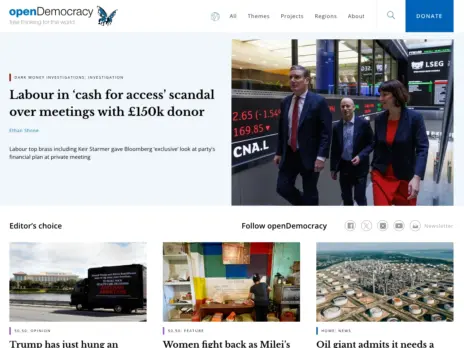
A solicitor failed in an attempt to sue a political blogger for defamation and malicious falsehood when a judge decided that the words of which he complained could not be held to refer to him.
The lawyer, Robin Tilbrook, chairman of the English Democrats party, sued Stuart Parr, the author of the Bloggers4UKIP blog for defamation and malicious falsehood, claiming that he was defamed in a post which said that two former BNP members had joined his party and ended with the words “English Democrats: Not left, not right, just racist.”
Mr Tilbrook said he was chairman and a founder member of the English Democrats, which was campaigning for an English Parliament and Government like that in Scotland within a federal UK, and which was was expressly open to all people of any background or ethnicity who shared its aims.
Mr Parr applied for the case to be struck out, or for summary judgment.
Mr Justice Tugendhat said: “The main issue before the court in this application is whether the words complained of are capable of being understood as referring to the claimant.
“The claimant is not named. Nor do the Particulars of Claim set out any facts relied on which might be known to any particular publishees, and no publishees are identified.
“The only fact set out in the Particulars of Claim relevant to the issue of whether the words complained of are capable of referring to the claimant is the fact that he is the chairman of the English Democrats.”
He had concluded, he said, that the words complained of were not capable of referring to Mr Tilbrook.
The judge said Jonathan Scherbel-Ball, for Mr Parr, had argued that it was settled that words could not be defamatory of a claimant unless they were capable of being understood by a reasonable reader as referring to that person.
In Knupffer v London Express Newspaper Ltd ([1944] AC 116) the House of Lords had held that the leader of a political party of Russian émigrés which had some 200 members in total, of whom 24 were in the British branch, had not been defamed by a newspaper article which described the party as “a minute body professing a pure Fascist ideology…”
The House of Lords said the test, when a claimant was not named, was whether the words “would reasonably lead persons acquainted with the plaintiff to believe that he was the person referred to”.
This test, said Mr Justice Tugendhat, was “essentially the same as the test to be applied where the question is whether the words complained of have a particular meaning”, which was most recently formulated by Sir Anthony Clarke MR in Jeynes v News Magazines ([2008] EWCA Civ 130).
“The policy of the common law has long been to give effect to the right of freedom of expression,” Mr Justice Tugendhat went on.
In Derbyshire CC v. Times Newspapers Ltd ([1993] AC 534) the House of Lords had held that it was “of the highest possible importance that a democratically elected governmental body, or indeed any governmental body, should be open to uninhibited public criticism” and that the threat of a libel action would inevitably have an inhibiting effect on freedom of speech.
In Goldsmith v Bhoyrul ([1998] QB 459) Mr Justice Buckley had said the principle had to apply equally to a democratically electable political party.
Mr Justice Tugendhat went on: “In my judgment this case is indistinguishable from Knupffer. On one view it may be a stronger case than Knupffer.
“In Knupffer no individual was referred to by name. But in the present case the words complained of do identify two individuals, both connected to the BNP, who are said to have joined the English Democrats.
“The reader might be thought more likely to understand that it is these individuals who are the targets of the allegation of racism, rather than the claimant.
“But whether that is so or not, as the editors of Gatley on Libel and Slander 11th Edition at para 7.9 observe, there is a risk that discussion of matters of public concern may be inhibited if the law is too ready to hold that an individual is identified by an attack on a group in which the individual is not named.”
Mr Tilbrook himself had also pointed out that if he was entitled to sue, then all the English Democrats’ other publicly identified officers and members would also be entitled to sue, said the judge.
Mr Tilbrook had indicated that he might wish to rely on other publications, the judge said, adding that if, after reading the judgment, he wished to apply for permission to amend his claim, he should submit a draft.
But there might be further issues.
“In an internet publication there is no presumption of publication as there is with the print copy of a newspaper (Amoudi v Brisard ([2007] 1 WLR 113, [2006] EWHC 1062 (QB) at para 37), and no presumption that a reader who has read one article on a blog will have read all the other articles,” the judge said.
“Further, Mr Scherbel-Ball has made clear that he would wish to submit there are no particulars pleaded in the Particulars of Claim which amount to a proper plea of malice in accordance with the established case law (eg Telnikoff v Matusevitch ([1992] 2 AC 343) and Horrocks v Lowe ([1975] AC 135)), nor any special damage alleged, such as would be necessary for a claim in malicious falsehood.”
Email pged@pressgazette.co.uk to point out mistakes, provide story tips or send in a letter for publication on our "Letters Page" blog






